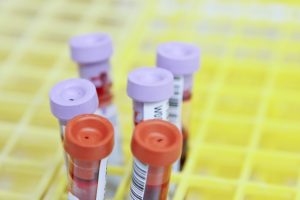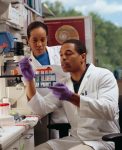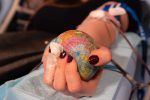Аlthough, once you have completed your phlebotomy training, you already have the right to be employed,
the chances of that happening are not very high.
Now you are probably wondering how that is possible when you meet all the conditions for employment.
That is because, with regular four-month training, you are not able to learn enough practical skills, while employers want someone they can be sure is 100% committed to phlebotomy.
But do not give up. It is expected.
In that case, you have two choices:
Page Navigation
Job Phlebotomy Training
Even though you have already gone through phlebotomist training, you will also need to visit on-the-job training as well, and this is because, in the regular training course, you work on a mannequin arm.
In contrast, here, you will have to work on a real person and under a supervisor’s supervision.
Even for those who have a certificate, this is mandatory.
Yes, they indeed have a better chance of getting a job than those who do not have a certificate.
Still, they will have to go through this training.
When you are hired as a phlebotomist, your training will consist of working directly with a supervisor due to the fact that you have hardly acquired enough practical skills in a 4-month training program.
The purpose of on-the-job phlebotomy training is to build on the academic knowledge you have gained at your local college.
If you have already completed a phlebotomy training course, you may be wondering why you should bother with additional training at home.
But nothing compares to working in a hospital or a busy clinic.
When you are hired, you will probably start as a phlebotomy intern.
Each facility has its time frame, but some will not allow you to work alone until you have at least two years of experience under the belt.
Yes, phlebotomy is the starting position.
Nothing compares to performing successful sticks day by day.
When doing this under supervision or watching others do it, it can be helpful.
When you have completed phlebotomy training in less than a year, you need to know how to do venipuncture.
You probably should have done this for a large number of volunteers or other students.
You are also given information on classroom training style.
There are many various reasons why you should train in hospitals, clinics, etc.
They should offer practical training.
Our expert team’s research will focus on giving results regarding the main things that you should pay attention to when applying for a job as a phlebotomist.
You will regularly learn something new because they come across various scenarios every day.
You probably won’t get to work unattended for months.
But this training period is necessary for you and your employer!
Phlebotomy on-the-job training guarantees that you will develop the experience you need for independent work.
It also guarantees that the medical institution that hired you works hard to maintain the highest service standards for all its patients.
If we hire you right away, you may need a few more months (or sometimes up to two years) as an intern before you can work on your own.
So, is the complete initial training worth it?
Probably the answer is yes. Phlebotomy is a fast-growing career, but it is also rewarding and can be quite lucrative.
You can choose more schooling throughout your career.
This can help you in various positions in medicine.
Nurses and doctors can even start as phlebotomists as long as they continue their education.
Remember that even when you begin, on-the-job training means you will still be paid for what you do.
But it is a great alternative to start and can lead to a long career.
The more experience you gain through your work, the better.
Experience and time are often what the phlebotomist promotes.
With enough experience, you can move up to a supervisory position.
This means that maybe one day, you will be the person overseeing the new phlebotomy trainees.
If you are willing to get a job as an intern, you can easily find a job as a phlebotomist even without experience.
Each facility will have its instructions on how long you will need to train at home.
But this internship period mustn’t be seen as just another step to be taken.
Getting training as a phlebotomist has many benefits.
There may be separate tools or equipment that you will need to use in a medical facility.
There is a good chance you will not include them all in your training program.
Some of these tools and equipment go hand in hand with various venipuncture techniques.
So, it is just as important not only to know how to use them but also to be comfortable with them.
Even if you have learned about specific tools and equipment, there is no substitute for hands-on experience.
You can get it when you use them in the work environment.
A supervisor will usually show you how to use them, and you can watch how they work.
If you are already practicing medicine, switching to phlebotomy can be a natural step!
You will still need to attend an official training course, but you may not have that much in-house training.
Тhis training will probably be much more challenging than the usual one, and that is because your employers want you to be maximally prepared for independent work.
In-House Training for Phlebotomists
This is also a type of on-the-job training, but the difference is that you will be considered as a trainee.
Your employers know that you need to perform venipuncture countless times on volunteers or other students to complete phlebotomy training.
Still, venipuncture on training and in a crowded hospital or clinic is not the same.
And because this job carries a considerable number of risks, you will not perform independent work until you have at least two years of experience.
Even taking extra steps to get confirmation of phlebotomy may not be enough.
Yes, certification is excellent for more experience.
It will also probably help you to be employed compared to someone who has not received certification.
But that does not mean you have all the training and skills you need to work with patients on your own.
You’ll learn things at work that cannot be taught in class for more than a few months.
You have already completed a phlebotomy training course, and you may be wondering why you should bother with additional practice at home.
There are many various reasons why you should train in hospitals, clinics, etc.
They should offer practical training.
You may think that you have learned everything you need to know about phlebotomy from your training program.
If that were true, medical institutions would not offer on-the-job training.
You can learn a lot more and develop your career when you are ready to get more education from your workplace.
It can be beneficial, the fact that you will perform under the supervisor’s supervision only, or watch the other volunteers’ performance.
The Benefit of in-House Training
Although these training will be much more complicated than the ordinary ones, many things can be learned from them, including:
Different Venipuncture Techniques
We think you already know how to do venipuncture, but what will happen if a patient comes with no visible veins?
You can’t look for his vein for hours or stab him until you find the vein.
Or some obese patient gets frustrated because you could not find his vein, or even you will have to work elsewhere with other syringes and needles.
What is even more critical in this area of on-the-job training is giving you a better chance of staying calm under pressure.
The more prepared you are to deal with these types of situations, the better it is.
The more relaxed you can be, the easier it will be to get it right.
You can also help calm your patient.
By going through the phlebotomy training program, you will learn the basics of drawing blood.
You will also need to have a successful blood draw to graduate.
Exactly these types of training allow you to master all this and work in any conditions with any patients.
Personal Skills
As we all know, phlebotomy is such a profession where the most important thing is your behavior with the patient.
This training will teach you the best behavior a phlebotomist should have, behave in the workplace, and behave with a rude patient.
It will also teach you many more essential things that will help you in your future career as a phlebotomist, including:
- Tolerance
- Patience
- Responsibility
- Kindness
- Organizational skills
- Teamwork
Maybe teamwork is just as essential as your behavior.
As a phlebotomist, you will work in a team, and you must be willing to cooperate with them because cooperation is the key to success.
If one or more of these skills do not come naturally to you, use the additional training opportunity to improve yourself.
The best part about learning these skills in the workplace is determining exactly how your employer wants you to behave around the patients.
A training program can teach you the details of what it takes to be a good phlebotomist.
But your employer can expect more, especially when it comes to personal claims.
Not everyone has the perfect traits to be a phlebotomist.
But medical facilities usually require specific manners and vital patient service.
If you do not naturally have some of these skills, you can go through orientation and training to become better at them.
You’ll have to keep your employer’s reputation and name in everything they do.
So, of course, they would be willing to take the extra time to make sure your personality is on par with their mission.
It is essential to note that the training program can teach you everything you need to know how to be the best phlebotomist.
But your employer can expect more, especially when it comes to personal claims.
Here is an example that every phlebotomist experiences every day.
Your job as a phlebotomist is to draw blood, and now you’ll have to cooperate with the lab, which works together to discover the patient’s diagnosis.
Further, they give the diagnosis to either the physician who will provide it to the patient or a specialist if their condition is specific.
Remember this, as a phlebotomist, it starts with you, but you are just a part of the enormous system.
Physical Skills
First, strong eye-eye coordination is necessary.
This may not seem like a big deal, and you may not even think about how good you are at it.
But when working with needles and veins, it is a necessity.
More venipuncture exercises will help you assess your coordination and can help you improve over time.
If you work in a large facility, the chances of being on your feet the whole day are high, and you may walk a lot and may need to move quickly between patients and transfer blood samples.
If you are not physically up to the task, you may not be well for a large or busy hospital.
Your on-the-job training time will give your employer a better idea.
You may even realize that you do not comply with the physical requirements.
And it is essential to note that you’ll learn a lot from your employer during this period, but they can also learn a lot from you.
Safety Procedures
Again, when you have already covered the basics of safety procedures in your typical training session, you will have to learn how to set them up for employment as well.
You may need additional training. I’m glad you took these extra steps to protect yourself.
Employers will teach you to their safety procedures to prevent the risks listed above.
It is not essential if you are working in a clinic or hospital.
It is important to note that each place has its own set of rules, and being familiar with the rules and regulations will help keep you and your patients safe.
Phlebotomists need to travel to different areas.
If you work in a hospital, you may often have to go from floor to floor, especially when taking samples in a laboratory.
It would be best to learn how to do this properly and the safety precautions in the lab.
Extra Training Opportunities
Some medical facilities may require you to complete an additional course such as CPR, which will substantially impact your future career.
For example, we can say that some medical facilities may want you to take additional training courses before you can work on your own.
One of the most common approaches to take is CPR.
Getting CPR certified is incredibly important whether you work in a hospital or a small private practice.
However, not every phlebotomy training course offers CPR certification.
CPR is not something you will learn at work.
However, you may need to take an additional lesson as one of the conditions for employment.
Some hospitals may require you to take other courses.
It all depends on where you work and what other duties can be expected of you.
But not all facilities offer CPR, some may need you to have completed another training course to get a job, so you should resolve this at the job interview.
Getting Post-Training Experience
Maybe you thought that after all this training, it is time to get a job.
I am sorry to disappoint you, but even though you are technically able to work, most institutions avoid hiring inexperienced phlebotomists.
So in one of the following ways, you will need to try to improve your resume.
Phlebotomists are needed everywhere, not just in busy hospitals!
But many organizations cannot afford full-time phlebotomists.
So, they depend on volunteers in phlebotomy.
Not only does it allow you to reciprocate, but you will also gain hands-on experience in the real world.
Or you can decide to take a different opportunity.
If a medical facility does not employ you as an employee, you may get an internship.
Internships provide on-the-job training, but you will not usually be paid.
You also probably will not have as many responsibilities as the phlebotomists who were hired at the facility.
As an intern, you will work with a phlebotomist and this is still a great way to gain experience in a particular environment.
For example, a hospital may be more willing to hire you if you do an internship there.
For all that we’ve said, we can conclude that there are two main post-training experience jobs:
Internships
If the medical facility does not hire you, you have the opportunity to get an internship, which means that you will not be paid for your work.
You will not have the employed phlebotomists’ responsibilities, but you will work with them and be their shadow.
Volunteering
Not only do hospitals need phlebotomists, but many other organizations need them as well.
There are plenty of organizations that cannot afford to employ full-time phlebotomists on staff.
That is why they depend on phlebotomist volunteers.
Some of them are:
- The American Red Cross
- Veterans’ hospitals
- Local blood drives/blood banks
- Nursing homes
Doing a job as a phlebotomist volunteer is one of the best ways to get experience and boost your resume.
The Bottom Line
From all that we’ve said, we have divided the most important of the above into several sub-items, where they belong:
- Phlebotomy on-the-job training guarantees that you will develop the experience you need for independent work.
It also guarantees that the medical institution that hired you works hard to maintain the highest service standards for all its patients.
You will still need to attend an official training course, but you may not have that much in-house training.
Тhis training will probably be much more challenging than the usual one, and that is because your employers want you to be maximally prepared for independent work.
- Your job as a phlebotomist is to draw blood, and now you’ll have to cooperate with the lab, which works together to discover the patient’s diagnosis.
- If the medical facility does not hire you, you have the opportunity to get an internship, which means that you will not be paid for your work.
- There are plenty of organizations that can not afford to employ full-time phlebotomists on staff. That is why they depend on phlebotomist volunteers.
- As a phlebotomist, you will work in a team, and you must be willing to cooperate with them because cooperation is the key to success.
Considering this, it has never been a better time and a better place for anyone to start a new part of their life by starting a career in phlebotomy.
This page is also available in Spanish.












